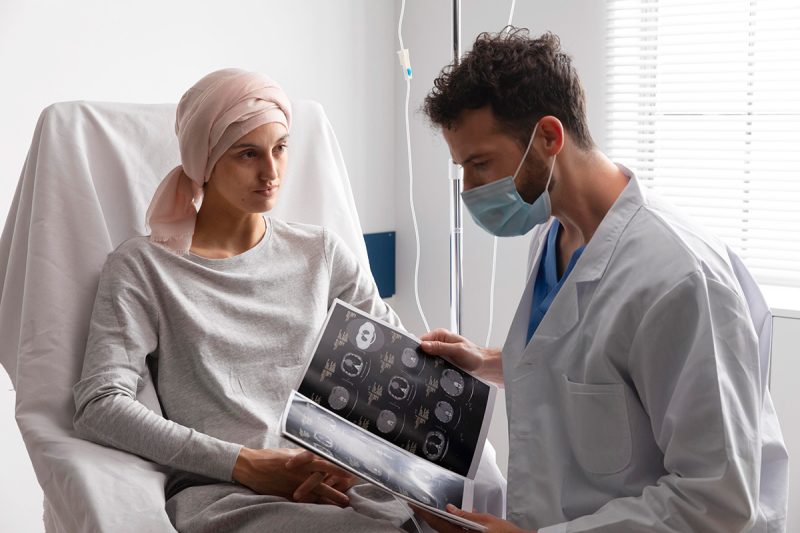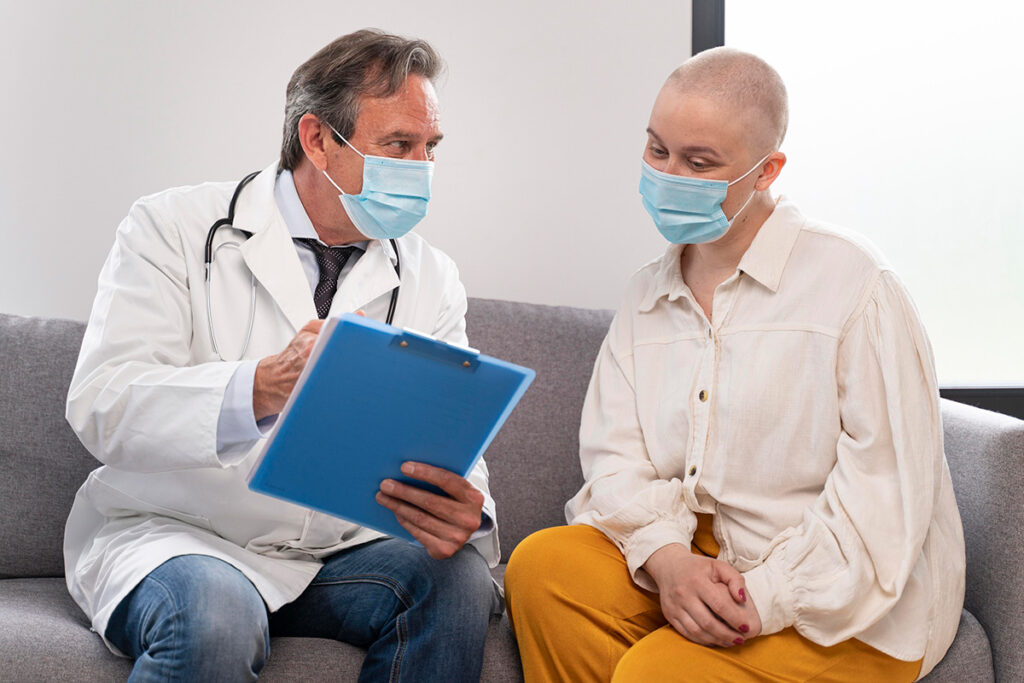Coping with a Cancer Diagnosis:
A Patient’s Guide

A cancer diagnosis can be life-altering and very emotional. Days after the diagnosis, patients may feel overwhelmed with medical decisions, emotional turmoil, and changes in life. This guide provides patients and their families with the strength, knowledge, and support they need to navigate this journey.

1. Processing the Diagnosis
News regarding a cancer diagnosis brings about shock, disbelief, anger and fear. Take time to process these emotions. Allow yourself to feel them and express yourself. Patients have learned that talking through their feelings with loved ones or a counselor that they trust can be very helpful in providing a safe emotional haven.
Practical Tips
- Take time to absorb the news; no need to rush through decisions immediately.
- Write down any feelings you may have in a journal to help process your thoughts.
- Talk through concerns and feelings with a trusted friend or counselor.
2. Building Support System
Support from family members, healthcare professionals, as well as online communities can have a great psychological impact. Surround yourself with people who are understanding, patient, and positive and add stability and encouragement when you need it most in these difficult times.
Practical Tips:
- Discuss your diagnosis with family or friends who can give you emotional support.
- Join a cancer support group to interact with other survivors.
- Visit social workers or patient advocates within the treatment facility for further help and assistance.
3. Information Gathering
Knowledge is power, and by knowing what kind of cancer you have, the treatment options, and what side effects may be encountered, you will be better equipped to make wise decisions. Just don’t try to absorb it all at one time-that might be overwhelming.
Practical Tips:
- Keep a notebook of your medical appointments so that you can jot down your questions and answers.
- Ask for printed materials or online references from your doctor.
- Consider bringing a friend or family member along to your appointments to help remind you of details and keep you supported.
4. Treatment Decisions
You are going to have to make multiple medical decisions once you get diagnosed. Working closely with your healthcare team as well as taking some time to understand each step really helps you decide the best course of action for you.
Practical Tips:
- Tell your doctor to explain every option, side effects, and success rates.
- Discuss getting a second opinion to help you feel clear and confident in your choice of treatment.
- Do not be afraid to ask questions about the cost and logistics involved and what you can expect as outcomes.
5. Maintaining Your Health Cancer treatment is not easy on the body. Support your physical health with balanced nutrition, exercise, and plenty of rest. A healthy body will boost your energy levels, reduce your experience of side effects from treatment, and help build your resistance to emotional distress.
Practical Tips:
- Consult a nutritionist for your diet, keeping to your individual needs and treatment plan.
- Low-intensity exercises such as walking or some yoga will help in keeping the body strength and at the same time lessen the stress.
- Make sure you have enough rest and develop a routine of sleeping that will allow your body time to heal.
6. Supporting Mental and Emotional Health
The most important aspect, though not as apparent as the other two, is mental wellness. Therapy, meditation, journaling, and mindfulness practices help a lot with managing stress, anxiety, and depression.
Practical Tips:
- Engage in hobbies or activities that make you happy and feel normal.
- Consider counseling or therapy if these feelings of depression or anxiety become overwhelming.
- Deepen your breathing exercises or meditation to reduce stress.
7. Financial and Practical Knowledge
Many cancer diagnoses bring additional, unforeseen financial concerns and practical issues. Information about insurance coverage, out-of-pocket costs, and financial aid may help alleviate those concerns.
Practical Tips:
- Discuss insurance coverage with a financial counselor or patient advocate.
- Research local and national programs that provide some form of financial assistance for cancer patients.
- Set up a support plan for errands, transportation, or other needs with family members or friends.
8. Contemplating the Future
Planning can be in a way overwhelming but at least will give a patient a sense of control and power over the future. This may include setting up a healthcare directive, research on what treatment milestones mean, or your list of goals and dreams to ponder during your treatment.
Practical Tips:
- Write down your short-term and long-term goals, but this time focus on things that you look forward to.
- Consider talking to an attorney regarding advance directives or other end documents to ensure your wants are carried out.
- Manage expectations about recovery and start envisioning life after treatment.
9. Communicating with Family and Friends
Communication with family and friends can be opened up and honestly done in order to talk about needs, concerns, and feelings. Sometimes loved ones don’t know what to say or how to help. It may just improve those relationships by telling them how to support you.
Practical Tips:
- Regularly check with your family members to tell them what’s going on with your treatment and concerns.
- Be prepared to set boundaries if you need time alone or just don’t want to constantly discuss your illness.
- Be open to having loved ones ask questions or seek out more information if they are uncertain about how to support you.
10. Hope and Resilience
Hold on to hope. Sometimes, the road is not a breeze, but it definitely will get you through to the other side. More and more cancer survivors report it’s this hopeful, resilient attitude that helps them navigate those ups and downs of treatment.
Practical Tips
- Celebrate small victories—for example, completing one session of treatment or getting through a health milestone.
- Read stories from cancer survivors who have been through some similar experiences.
- Keep reminding yourself that you are developing strength, even in your most difficult times, because that is what resilience means: not necessarily feeling okay, but learning to feel some kind of strength.
11. Integrative Therapies
Patients often discover additional therapies, which work along with standard treatments, as helpful in their therapy. These could include acupuncture, massage, meditation, or even art therapy. Some provide relaxation and pain reduction while helping one express emotionally.
Practical Tips
- Talk to your healthcare providers about integrative therapies you may be safe to undertake alongside treatment.
- Try different treatments to determine which ones cause the most comfort, relief, or relaxation.
- Be wary of frauds and only work with established resources or professional practitioners.
12. Finding Meaning and Purpose
A cancer journey can prompt reflection on life’s purpose and priorities. Finding meaning in your experiences can foster a sense of peace and connection, whether through spirituality, relationships, or personal goals.
Practical Tips:
- Explore spiritual or religious practices that resonate with you.
- Activities to be engaged with reference to meaning, volunteering, writing, connecting with nature.
- Develop relationships and experiences that add value to life.
Coping with a cancer diagnosis is undeniably hard, but a supportive network, well-informed choices, and focusing on holistic well-being may enable patients to walk through this journey with resilience and hope. One step at a time and both physical and emotional health being prioritized can change this experience into one of strength, courage, and growth. Remember, you’re not alone—there’s support, and there is hope, even on the hardest days.
Frequently Asked Questions
Good digestion ensures proper nutrient absorption, strengthens immunity, and boosts energy levels. It also prevents complications like weight gain, hormonal imbalances, and chronic diseases.
Consider the insurer’s financial stability, claims process, coverage terms, and inclusion of services like teleconsultation and diagnostic tests. These factors ensure smooth access to care and timely claim settlements.
Poor digestion can cause nutrient deficiencies, weakening the immune system and leading to fatigue. It’s also linked to weight gain, diabetes, and mental health issues.
Adopt a balanced diet rich in fiber and fermented foods, quit smoking, avoid alcohol, exercise regularly, and manage stress to support healthy digestion.
It offers comprehensive benefits, including hospitalization, diagnostic tests, and teleconsultation, with a reduced waiting period for pre-existing conditions and cashless treatments.
Hi, my name is Om, and I am a developer at Carepal Secure. With a strong passion for technology and innovation, I enjoy creating effective solutions and learning new skills to enhance my expertise. My journey in development has been both challenging and rewarding, allowing me to grow professionally while contributing meaningfully to the projects I work on.












